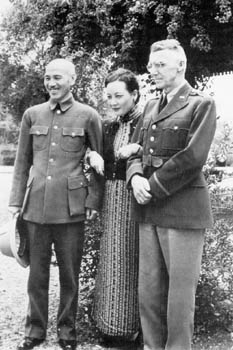Joseph Stilwell
|
|

Joseph Warren Stilwell (March 19, 1883 – October 12, 1946) was a United States Army four-star general known for his service in China. His military career was unique: throughout it he rarely commanded troops, worked on mostly his own, and still managed to reach the rank of four-star general. He spent most of his career outside the United States in China and, a very capable linguist, spoke Chinese and Japanese fluently.
"Vinegar Joe", as he was called, famously lacked tact and a capacity for conventional diplomacy. In spite of this, he tried to convince Generalissimo Chiang Kai-shek to cede command of his armies to the American military. He intensely hated the Generalissimo, a feeling which was reciprocated, and only managed to keep working together through the tireless diplomacy of Chiang's wife, Soong May-ling. Among the areas of contention between Stilwell and Chiang was the distribution of foreign military aid. Stilwell wanted the modern weapons distributed evenly amongst the KMT and the Communists in the fight against the Japanese but Chiang believed that arming the Communists with American weaponry could compromise his control. Furthermore, Stilwell desired a more aggressive role for the Nationalist Chinese Army after 1941 but Chiang preffered keeping his troops for defense and allowing the Americans to fight in the Pacific. Their differences could ultimately be traced to the Chinese Civil War as Chiang still felt distrust in the Communists due to his belief that the greatest threat was the Communists rather than the Japanese. Stilwell, on the other hand, had hoped for a complete united front and for Chiang to put aside his fears.
Like many other Americans involved in Chinese affairs, Stilwell's diplomatic efforts were obliterated with the rise to power of the Communist Party of China and retreat of the Kuomintang government to Taiwan in the Chinese Civil War. Biographer Barbara W. Tuchman very fittingly chose the metaphor "sand against the wind", to characterise the futile nature of Stilwell's efforts.
Stilwell had first been posted to China as Chief of Staff to Chiang Kai-Shek. However, as the campaign in Burma developed, he also took on a role there. The US Army established the China Burma India Theater (CBI Theater), and placed Stilwell in command. The CBI Theater was not supposed to be an operational headquarters. It was merely supposed to be in charge of the administation of the American military formations in China, Burma and India. However, Stilwell often broke the chain of command and communicated directly with the Joint Chiefs of Staff on operational matters, when all such communications were supposed to go to Admiral Lord Louis Mountbatten the Supreme Allied Commander, South East Asia and also on taking operational control of Northern Combat Area Command (NCAC) through General George Giffard commander of 11th Army Group.
Stilwell thus had four different jobs to perform, which required him to be in different places at once. For example, as Chief of Staff to Chiang, he was often needed in Chungking, the Chinese capital, and as Deputy Allied Supreme Commander he was needed at HQ South East Asia Command at Khandy in Ceylon and as NCAC commander he was required to be relatively near the frontline in Burma. His personality also caused problems. Stilwell clashed frequently with the commander of the 11th Army Group, General Giffard, and would not accept being under his command, instead insisting that NCAC came directly under the Supreme Commander. As Deputy Allied Supreme Commander he was Giffard's superior but as operational commander of NCAC Giffard was his superior, as the two men did not get on this inevitably lead to conflict and confusion.
In October 1944, due to personal disagreements with Chiang Kai-Shek, President Roosevelt recalled Stilwell to the United States. His former role was split as was CBI:
- Lieutenant General Raymond Wheeler became Deputy Supreme Allied Commander South East Asia.
- Major General Albert Wedemeyer became Chief of Staff to Chiang Kai-shek and commander of the U.S. Forces, China Theater (USFCT).
- Lieutenant General Daniel Sultan was premoted from deputy commander of CBI to became commander of the U.S. Forces, India-Burma Theater (USFIBT) and commander of the NCAC.
His replacements were not only less abrasive characters, but as they each concentrated on one area there was less institutional conflict and confusion.
He was reassigned to command the Tenth Army during the final stages of the Battle of Okinawa after the Tenth Army's commander was killed by enemy fire.
His son, Brigadier General Joseph W. Stilwell Jr., served as a senior commander during the early U.S. involvement in the Vietnam War.
He was the subject of a noted biography by Barbara W. Tuchman.
See also
External links
- THE STILWELL PAGES (http://cbi-theater-3.home.comcast.net/stilwellpages)de:Vinegar Joe (General)
